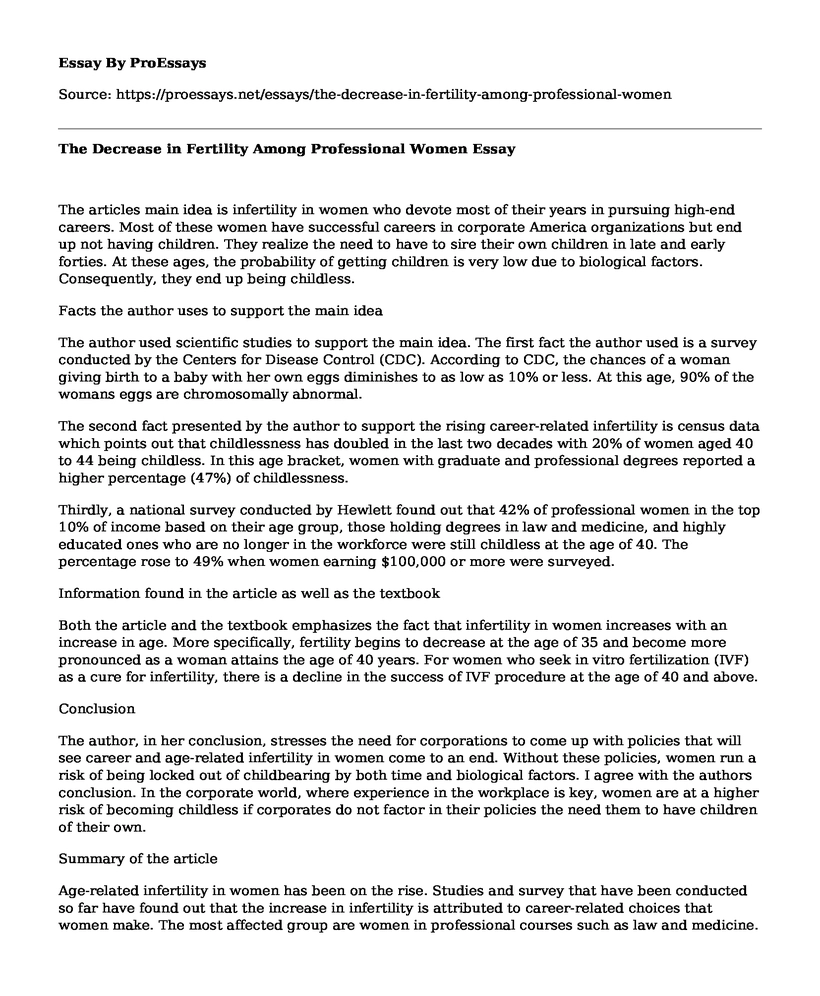The articles main idea is infertility in women who devote most of their years in pursuing high-end careers. Most of these women have successful careers in corporate America organizations but end up not having children. They realize the need to have to sire their own children in late and early forties. At these ages, the probability of getting children is very low due to biological factors. Consequently, they end up being childless.
Facts the author uses to support the main idea
The author used scientific studies to support the main idea. The first fact the author used is a survey conducted by the Centers for Disease Control (CDC). According to CDC, the chances of a woman giving birth to a baby with her own eggs diminishes to as low as 10% or less. At this age, 90% of the womans eggs are chromosomally abnormal.
The second fact presented by the author to support the rising career-related infertility is census data which points out that childlessness has doubled in the last two decades with 20% of women aged 40 to 44 being childless. In this age bracket, women with graduate and professional degrees reported a higher percentage (47%) of childlessness.
Thirdly, a national survey conducted by Hewlett found out that 42% of professional women in the top 10% of income based on their age group, those holding degrees in law and medicine, and highly educated ones who are no longer in the workforce were still childless at the age of 40. The percentage rose to 49% when women earning $100,000 or more were surveyed.
Information found in the article as well as the textbook
Both the article and the textbook emphasizes the fact that infertility in women increases with an increase in age. More specifically, fertility begins to decrease at the age of 35 and become more pronounced as a woman attains the age of 40 years. For women who seek in vitro fertilization (IVF) as a cure for infertility, there is a decline in the success of IVF procedure at the age of 40 and above.
Conclusion
The author, in her conclusion, stresses the need for corporations to come up with policies that will see career and age-related infertility in women come to an end. Without these policies, women run a risk of being locked out of childbearing by both time and biological factors. I agree with the authors conclusion. In the corporate world, where experience in the workplace is key, women are at a higher risk of becoming childless if corporates do not factor in their policies the need them to have children of their own.
Summary of the article
Age-related infertility in women has been on the rise. Studies and survey that have been conducted so far have found out that the increase in infertility is attributed to career-related choices that women make. The most affected group are women in professional courses such as law and medicine. Also, not left out in this group, are highly educated women and those whose incomes are in the upper 10% of their age group.
This group of women has placed career as the most important thing in their lives. After graduating from colleges in their twenties, they get into jobs and devote the next ten years or so in building their careers. By the time they have established careers and are ready to start a family, most of them would have hit the age of 35 and above. This is the age at which the chances of conceiving a baby begin to decline. The decline is attributed to biological factors e.g. chromosomal abnormalities that increase with the advancement of age.
The decrease in fertility among professional women has resulted in a rise infertility clinics. The infertility clinics have become useful in treating age-related infertility cases. One of the procedures carried out to restore fertility is IVF. Despite the availability of IVF procedure in hospitals, the procedure has been found to do little to solve infertility problem in women aged 40 years and above.
To solve this problem, the author proposes that corporations enact family-friendly policies such as paid parental leave and career breaks that can allow a worker to leave a job and return to the same job after a period of time. Such policies give employees an opportunity to have children.
Cite this page
The Decrease in Fertility Among Professional Women. (2021, Mar 19). Retrieved from https://proessays.net/essays/the-decrease-in-fertility-among-professional-women
If you are the original author of this essay and no longer wish to have it published on the ProEssays website, please click below to request its removal:
- HIV/AIDs Pandemic Essay Example
- Peer Pressure in Teenagers Essay Example
- Aravind Eye Hospital Case Analysis Paper Example
- Research Paper on Diagnosis and Treatment of Multiple Myeloma
- Essay Example on Women in Buddhism: Debates, History, and Feminism
- Essay Example on Woman With Chest Pains Seeks Medical Care: Physical Exam Results
- Essay Sample on Babies' Attachment Patterns







